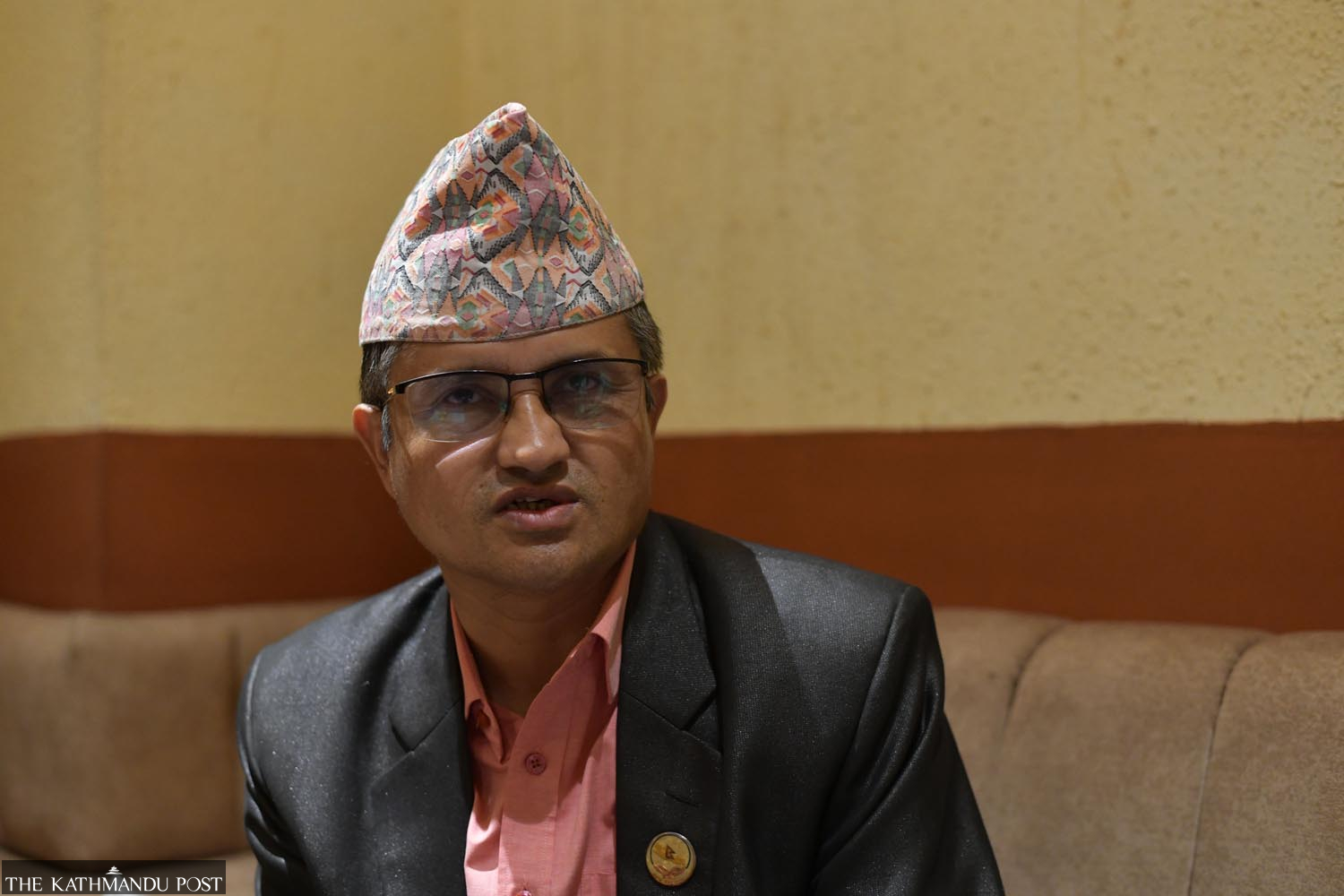Interviews
The concept of cooperatives as self-regulated entities has failed
The trail of money and the company’s joint account directly link Rabi Lamichhane to the misuse of cooperatives deposits.
Thira Lal Bhusal
The parliamentary special probe committee formed to investigate cooperatives scam submitted its report last week. The government has already started implementing the report. In this context, Post’s Thira Lal Bhusal sat down with the committee chair Surya Thapa for more insights on the probe’s findings and the anomalies in the cooperative sector they saw during the investigation.
After your committee submitted the report on cooperatives scam, people have interpreted its findings in different ways. Why the confusion?
Our committee prepared, finalised and endorsed the report unanimously. No member registered any dissent. This is an important point. However, people have interpreted its findings a bit differently. The supporters of [Rastriya Swatantra Party chair] Rabi Lamichhane have tried to make it appear like the report has given him a clean chit. They have selectively taken a certain portion of the report which states that Lamichhane’s involvement couldn’t be formally established in the process of transferring funds from cooperatives to the Gorkha Media Network.
But a huge amount of money has been provided to the Gorkha Media Network from various cooperatives against the Cooperative Act 2017, which prohibits investment of cooperative deposits to any company. It is seen that Lamichhane is directly involved in spending the funds collected from the cooperatives. Based on that, we have found chair of the media company Gitendra Babu (GB) Rai, the then managing director Rabi Lamichhane, directors Chhabilal Joshi and Kumar Ramtel directly responsible in the misuse of cooperative funds and have asked the government to take action against them as per the existing laws.
The aforementioned two aspects are inextricably linked. We didn’t find any evidence of transfer of cooperative funds to Lamichhane’s personal bank account. It is sent to the bank account of the Gorkha Media Network. The KYC form of the Global IME Bank shows that Lamichhane is one of the three holders of the joint account. Any one of the three can issue cheques from the account. The funds invested as loan in the Gorkha Media Network have been transferred to the joint bank account, from where Lamichhane has released money by signing cheques. This is how Lamichhane is directly involved in embezzlement of the cooperative funds.
Many argue that as per the cooperative law only those who release money from the cooperatives are held responsible but not those who spend it after it is received at the company. Is that the case?
The Cooperative Act 2017 prohibits releasing any loan to a company. But it is sent to the company, where Lamichhane is an owner with 15 percent share and a managing director. And, the money is misused there. An informal statement of GB Rai shows Rs1.20 billion of cooperative deposits has been invested in the media company while our financial analysis shows the amount is Rs654 million. Evidence shows Rs220 million has been directly sent to the media company’s bank account. Depositors have been deprived of their money. Other staff working at the company aren’t responsible but the owners are. They could be charged with cooperative fraud under the Cooperative Act, fraud and duping under the National Penal Code, organised crime cases under the Organised Crime Prevention Act, and money laundering cases under the Prevention of Money Laundering Act.
Some individuals involved with various cooperatives including Roshni Gurung of a Butwal-based cooperative told the committee that they deposited millions of rupees in the bank account of a person named Rabi Lamichhane. Kumar Ramtel said the person named Rabi Lamichhane is none other than the Rastriya Swatantra Party chair. Still, the committee couldn’t establish the link. What is the complication?
The flow of the money shows the connection but documents to link the transactions are not available. We didn’t find documents with Lamichhane’s signatures and fingerprints that needed to be submitted to get a loan. All the seven cooperatives run by GB Rai were releasing loans without following due procedure. But we have successfully traced the flow of the money. The loan amount created in the name of Rabi Lamichhane in Butwal and deposited by Roshni Gurung had reached the Gorkha Media Network’s bank account which was jointly operated by GB Rai, Rabi Lamichhane and Chhabilal Joshi. This is an established fact. The committee didn’t find any document showing the flow of cooperative money to his personal account. But that alone is insufficient to give him a clean chit as a huge sum has been sent to the media company’s bank account jointly run by three people including Lamichhane. Another sum from the Supreme Cooperative has been deposited to the bank account of Gorkha Media Network. The bank voucher shows Roshni Gurung/Rabi Lamichhane as depositors. The amount also goes to the same joint account.
Now the government has forwarded the report to the investigation agencies. Do you think the agencies can unearth the missing documents?
Our committee worked in a different way to regular House committees. We followed methods of investigation just like the police investigation agencies and government’s prosecution agencies do. We recorded the suspects’ statements, took their fingerprints, and got the signatures to authenticate their statements. I believe this is a new practice by a Nepali parliamentary committee. Sufficient evidence has already been gathered in the past as well. While carrying out this task and preparing the 1,124-page document, we have followed the norms and procedures of an investigation body.
During the interrogation, many suspects told the committee that they knew nothing and shifted the responsibility to GB Rai, who is on the run.
Those from seven cooperatives–Hamro Nayakrishi Multipurpose Cooperatives; Swarnalaxmi; Supreme; Suryadarshan; Sahara; Samanata and Sano Paila and the officials from Gorkha Media Network gave such answers. Their common answer is, “I don’t know about this, GB Rai does.” Many of them might have been trying to evade their responsibility by blaming Rai.
The government has failed to produce Rai. Won’t this investigation be incomplete in his absence?
Based on its facts and evidence, the investigation report is complete. Yes, 29 suspects including GB Rai are at large. They are believed to be staying abroad. Their statements have not been recorded. But that doesn’t make the investigation incomplete. We have accessed the database of Gorkha Media Network and other cooperative organisations, collected important documents and analysed them. There is no confusion about the money embezzled in the scam. We have determined a total of Rs2.58 billion from various cooperatives has been misused by investing in several organisations including the Gorkha Media Network, Nature Nest, Nature Herbs, Gorkha Group of Investment, Gorkha Ayurved Company—49 people were responsible for these investments, including GB Rai. Of that, Rs654 million has been invested in Gorkha Media Network. A total of Rs8 billion has been embezzled in the seven cooperatives where Rai is involved. So the investigation is complete.

During the interrogation, some office bearers of cooperatives claimed they had no role in the transactions as they were dummy officials and GB Rai and some individuals Rai trusted did everything. How convincing is that?
The practice of creating dummy officials, fake documents, false marriages and divorces etcetera is rampant in the cooperative sector. In the seven cooperatives GB Rai is at the centre. He has at least one key person in each of these seven cooperatives as chair or manager and carries out everything through them. In some of them, the chairpersons know nothing. The cooperatives don’t follow any norms, rules and regulations of cooperatives. They work just on the basis of orders they get from Rai or his trusted individuals over the phone. Rai gets advice from a California-based individual named Gyan Bahadur Bamjan. The Cooperative Act prohibits an individual from being a member of more than one cooperative but Rai is involved in at least seven cooperatives as a chair, secretary, vice-chair or patron.
The government has decided to implement the report. How should the state agencies work to bring good results?
The government should immediately initiate action against four persons—Rabi Lamichhane, GB Rai, Chhabilal Joshi and Kumar Ramtel—as the report has found them responsible for misusing cooperative funds. We have also determined the roles and responsibilities of around 1,000 individuals who were chair, vice-chairs, secretaries, treasurers, account chiefs or others who in decision making roles in 40 cooperatives we were tasked to investigate. They should be brought under investigation and their properties should be seized so as to create an environment to return the depositors’ money.
Different arrangements need to be made about those who are in judicial custody. They should be released, their all documents including passports seized and they should be kept under surveillance and allowed to take initiatives to return the depositors’ money. The government, while unveiling the fiscal budget, had announced to take initiatives to return deposits upto Rs500,000 by keeping cooperatives’ assets as collateral. This process should be expedited. Likewise, the government should set up an all-powerful regulatory authority. At present, all the 753 local governments, seven provincial governments and the federal government have the regulatory role. That is pointless. Now a strong dedicated regulatory authority should be formed. The Crisis-ridden Cooperatives Management Committee is there but it should be made more effective by giving it greater executive powers. When a cooperative is in crisis, the regulatory body should take over its management and fix the crisis just like Nepal Rastra Bank does in the banking sector.
What patterns of anomalies did you find in the cooperatives?
The fundamental idea of a cooperative is to run by its own members based on self-regulation. But a few board members were found to be using all the authority and misusing the funds while members were unaware about the affairs in the organisations. The board members use most of the resources for their relatives and other closed ones. Annual meetings are organised as picnics and wedding parties. In some cases, annual meetings are fake, audit reports, auditors and signatures, all are fake.
In the course of preparing the committee report, I have coined terms like ‘cooperative divorce’ and ‘cooperative marriage’. Divorce and marriage documents are prepared based on the fortune of the cooperatives. There was misappropriation of Rs120 million in a cooperative, where Jyoti Gurung was manager, in 2075 BS. Dhan Raj Gurung, who is Nepali Congress Vice-president, divorced his wife Jyoti in 2076 BS. But, in 2077, Dhan Raj presented himself as a guarantor of a loan to Jyoti. Again in 2080, both of them jointly paid back a loan of Rs9.1 million. This is a bit of a trend in the cooperative sector.
Do you think we need to reconsider the basic idea of cooperatives as self-regulated organisations?
In the report, we haven’t questioned its principle, need and importance. Cooperative sector is vital for our economy. But the concept of self-regulation as stated in the Cooperative Act 2017 has failed. Now, this sector should be overseen by a strong regulatory body. Still, the idea of self-regulation can be given continuity as the members should be allowed to run the cooperatives on their own but their activities should be strictly regulated by a powerful authority. Moreover, the cooperatives that do big transactions should be regulated by the central bank.
Why did the present regulatory bodies fail?
There were over 50 lawmakers who proudly identified themselves as office bearers of certain cooperatives. They over-emphasised self-regulation and undermined the role of regulatory bodies. Individuals like GB Rai and other fraudsters benefited from that. Therefore, we recommended stringent laws and a stronger regulatory authority.




 20.12°C Kathmandu
20.12°C Kathmandu




.jpg&w=200&height=120)







